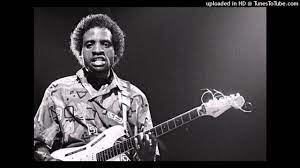
John Chibadura
By Pamenus Tuso
Poverty, abuse, passion and commitment inspired a former goat-herder and farm hand to pursue a career in music, rising to be one of the finest talents to emerge out of Zimbabwe.
Music lovers knew him by his stage name, John Chibadura, the man who took the Zimbabwe music scene by storm in the 1980s.
Chibadura was equally good singing either sungura, a genre that defined his success or reggae which endeared him with Zimbabwe’s emerging Rastafarian community then.
Born John Nyamukokoko on February 17 in 1957, in Guruve. Chibadura grew up in Mazowe about 30 kilometres west of Harare. His father and mother were farm labourers from Mozambique.
Chibadura lost his mother in 1962 when he was five old and his father remarried a woman who was very tough on John.
Due to financial constraints, Chibadura was unable to continue with his high school as he only went as far as form three. He was forced to look for menial jobs. This forced the young man to lead a nomadic life as he moved from one relative’s household to another. John was first employed as a shepherd and goat herder in the Darwendale farming area. The young man was not content with his position and started working on getting a more rewarding job. He finally got a better job, first as a tractor and then lorry driver.
Like most young men of his time working on farms, Chibadura began to learn the art of playing home-made guitar, known locally as a banjo. He became so good in playing the instrument that people nicknamed him Chibadura, meaning one who can play the guitar so well.
Chibadura moved to the capital, Harare, around 1980. He was exposed to a lot of music and musicians. Chibadura was especially inspired by Tinei Chikupo – a charismatic singer who used to perform daily at Mverechena Night Club, a place which John frequented.
Later on, after watching the late Oliver Mtukudzi performing, John was more than determined to develop similar or better skills of musicianship.
Chibadura launched his commercial musical career together with his friend Shepherd Chinyani who became part of a band known as The Holy Brothers.
The band was, however, short lived and some of the members were reported to have abandoned their musical careers. Chibadura and Chinyani teamed up with Chikupo who was the front man of a band called Mother Band which he had formed in the early 1980s.
Chikupo, however, left the band and Chibadura and Chinyani teamed up with Ronnie Gatakata, Bata Sinitirawo and they started performing in Mutoko at a local hotel.
After a misunderstanding with the owner of the hotel, the group relocated to Domboshawa where they signed a contract which enabled them to perform at Mverechena Hotel and the band was subsequently named The Mverechena Band.
After being offered a contract to perform at Mushandirapamwe Hotel in Highfields, the Mverechena Band left Domboshawa for Harare where they assumed a new name, The Sungura Boys with Chibadura as the band leader.
In 1983, Chibadura formed his own band, Tembo Brothers. His debut song with Tembo Brothers was Upney Hwandinetsa which turned gold within a short time.
Within a year another album Kugarika Tangenhamo was on the market.
From there Chibadura never looked back. It seemed everything John touched turned into gold.
At the Zimbabwe Music Cooperation (ZMC) gold disc awards in 1985, 1986 and 1987 John swept all the gold discs of the year for releases such as Mudzimu Wangu, $5 000 Kuroora and Sara Ugarike.
He had reached a point of no return. In 1988 he produced another mega-hit in the form of Zuva Rekufa Kwangu, a reggae tune.
That same year he made a very successful tour of Mozambique where he performed before packed stadiums. Ironically the Mozambique tour contributed to his demise musically.
“While Chibadura tried to hide under depression, the late singer had a nasty battle with debt collectors. He accrued the debts after he toured Mozambique for a couple of weeks where he had hired someone’s truck to carry the instruments. He was supposed to pay for all the days he spent with the truck there but some of the shows appeared to have flopped and he returned home swimming in debts,”
“The owner of the truck decided to attach his property and all household goods save for what was in his bedroom,” Chabadura’s family friend and son to yesteryear promoter, Landmine Madongonda, said in an interview with H-Metro.
Apart from Mozambique, Chibadura also toured Europe touching England, Northern Ireland and Holland, where his music was well received.
The release of Munemajerasi in 1990 saw John on the periphery of yet another gold disc award.
According to Madongonda, Chibadura succumbed to stress –induced depression caused by ballooning debts and loneliness .He died in 1999 at the age of 42.
After his death, the Tembo Brothers managed to record three albums under the leadership of Roderick Chomudhara.